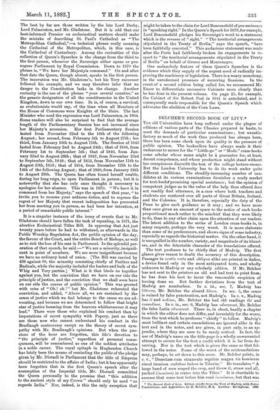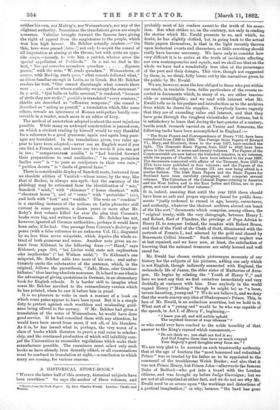BELCHER'S SECOND BOOK OF LIVY.* THE old Universities have long
suffered under the plague of editions of various parts of the Classics prepared in haste, to meet the demands of particular examinations ; but unsatis- factory as much of the work thus produced has always been, there has been some check upon its quality in the pressure of public opinion. The booksellers have always made it their endeavour to secure for the " Little-go " or " Mods." cram-books some scholar whose name might be a guarantee for, at least, decent competence, and whose production might stand without too conspicuous discredit the test of the college lecture-rooms. But the London University has to do its work under quite different conditions. The steadily-increasing number of can- didates at its various examinations furnishes a ready market for text-bookt promising special assistance; but the opinion of competent judges as to the value of the help thus offered does not readily find utterance, in a case where both teachers and students are scattered over all parts of Great Britain, Ireland, and the Colonies. It is, therefore, especially the duty of the Press to give such guidance as it may ; and we have more than once given an amount of space to the notice of such books proportioned much rather to the mischief that they were likely to do, than to any other claim upon the attention of our readers. The latest addition to the series of London cram-books is, in many respects, perhaps the very worst. It is more elaborate than some of its predecessors, and shows signs of some industry, especially as regards the historical matter. On the other hand, it is unequalled in the number, variety, and magnitude of its blund- ers, and in the detestable character of the translations offered.
The text professes to be chiefly that of Madvig. The first glance gives reason to doubt the accuracy of this description. Passages in oratio recta and obliqua alike are printed in italics, a device found only in the most antiquated texts, and wholly unknown to Madvig or any scholarly edition. If Mr. Belcher has not sent to the printers an old and bad text to print from, he has done his best to incur the reasonable suspicion of having done so. But further deviations from the text of Madvig are numberless. In c. iii., sec. 7, Madvig has litteras, Mr. Belcher the absurd litera. In sec. 5, the sense is ruined by false punctuation, not Madvig's. In c. v., Madvig has ii and eedisse, Mr. Belcher the bad old readings ibi and coneediese. In c. ix., sec. 6, Madvig has educarent, Mr. Belcher the false Latin educarent. There is, in short, hardly a. chapter in which the editor does not differ, and invariably for the worse, from the text which he professes " chiefly " to follow. Madvig's most brilliant and certain emendations are ignored alike in the text and in the notes, and are given, in part only, in an ap- pendix, where they are sure to be rarely noticed. In fact, the use of Madvig's name on the title-page is a wholly unwarranted attempt to secure for the text a credit which it is far from de- serving. Nor is the text which is given the same as that fol- lowed in the notes. Some of the worst of the mistranalations may, perhaps, be set down to this score. Mr. Belcher prints, in
c. v., " Desectam cum stramento segetem magna via homily= simul immissa corbibus fudere in Tiberim." He translates " A large band of men reaped the crop, and threw it, straw and all, packed (immissa) in crates into the Tiber." It is charitable to assume that some text before him read immieeam, but that was • The Second Book of Livy. Edited. chiefly from the Text of Madvig, with Notes Translations, and Appendices, by H. Belcher, M.A. London ; Bivingtons. li382 neither his own, nor Madvig's, nor Weissenborn's, nor any of the slightest authority. Sometimes the translations given are simple nonsense. Valerias brought forward the famous laws giving the right of appeal from the magistrates to the people, which won him high favour. Mr. Belcher actually renders:—" On this, laws were passed Elaine .1] not only to acquit the consul of all imputation at aiming at the throne, but with quite an oppo- site scope,—namely, to vote him a patriot, whence arose the special appellation of Publicola." In c. xxi. we find in the
text, " Nec qui consules secundum quosdam digerere possis," with the note, " W. reads quosdam." Weissenboru, of course, with Madvig, reads quos," what consuls followed what," an idiom familiar enough in Latin, as in Greek. But Mr. Belcher renders his text, " One cannot disentangle what consuls there were and on whose authority we accept the statement." In c. xviii., " Qui bella ex bellis sererent," is rendered, "because of strife they sow strife ;" quotidie is translated "every sessions;" shields are described as "offensive weapons ;" the consul is described as " acting as pontiff," a translation which, like some others, reveals an ignorance of Roman antiquities hardly con- ceivable in a reader, much more in an editor of Livy.
The method of annotation adopted is about the most injurious possible. While many an awkward construction is passed over, on which a student reading by himself would be very thankful ' for a reference to a good grammar, again and again long pass- ages are translated. In the translations given, two rules ap- pear to have been adopted,—never use an English word if you can find a French one, and never use two words if you can get in ten ; " comparaverant auxilia " is " had hurried forward their preparations to send auxiliaries ;" " in suam perniciem faciles esse " is "to pose as coadjutors in their own ruin ;" " publica decora " is " deeds of general fame."
There is considerable display of Sanskrit roots, borrowed from au obsolete edition of Vanieek—whose name, by the way, like that of Becker, is always mis-spelt—but the accuracy of the philology may be estimated from the identification of " mic," Sanskrit "wish," with " shimmer " (" horse chestnut " with " chestnut horse "), and of " venio " with " preterbito " (sic), and both with " foot " and " waddle." The note on " condicio " is a startling instance of the notions on Latin phonetics still current in some quarters, a dozen years or more after Mr. Roby's first volume killed for ever the plea that Corssen's books were big, and written in 'German. Mr. Belcher has not, however, ignored all German authorities ; perhaps it would have been safer, if he had. One passage from Corssen's Beitrdge ap- pears (with a false reference to an unknown Vol. II.), disguised by no less than seven misprints, which deprive the whole ex- tract of both grammar and sense. Another note gives an ex- tract from Kiihnast in the following form :—" Hand," says Kiihnast, page 350, "bei Livius wohl stets mit explicertem oder implicerten" (" bei Weitem nicht.") To Kiihnast's one misprint, Mr. Belcher adds two more of his own ; and unfor- tunately omits the substantive of the sentence, which, in the original, follows the parenthesis, " Zahl, Maas, oder Gradver- hiiltniss," thus leaving absolute nonsense. It is hard to see whatis the advantage of giving quotations in German, in an elementary book for English schools. It is harder still to imagine what sense Mr. Belcher ascribed. to the extraordinary version which he has printed, when he saw it before him in proof.
It is no pleasure to write in such a manner of a book on which some pains appear to have been spent. But it is a simple duty to protest against such worthless and misleading guid- ance being offered to the unwary. If Mr. Belcher had given a translation of the notes of Weissenborn, he would have done good service. If he had consulted them with any attention, he would have been saved from most, if not all, of his blunders. As it is, be has issued what is, perhaps, the very worst of a class of books which threaten to prove a real curse to scholar- ship, and the continued production of which will infallibly com- pel the Universities to reconsider regulations which make their manufacture possible. The examiners must select only such books as have already been decently edited, or all examinations must be confined to translation at sight,—a conclusion to which many are coming, for various reasons.



































 Previous page
Previous page